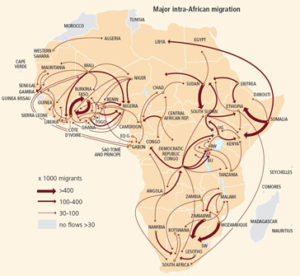An Evening With Chinua Achebe
Through his fiction and non-fiction works, Nigerian author Chinua Achebe has sought to repair the damage done to the continent of Africa and its people as a result of European colonization. This is best exemplified in his most famous novel “Things Fall Apart,” one of the first African novels written in English to achieve national acclaim. Set in the 1890s, the novel deals with the impact of British colonialism on the traditional Igbo society in Nigeria. Published in 1958 — just two years before the end of a century of British rule in Nigeria — the novel celebrated its 50th anniversary of publication in 2008. “An Evening with Chinua Achebe” featured the author reading from his celebrated work.
Thorstein Veblen ~ The Theory Of The Leisure Class
The institution of a leisure class is found in its best development at the higher stages of the barbarian culture; as, for instance, in feudal Europe or feudal Japan. In such communities the distinction between classes is very rigorously observed; and the feature of most striking economic significance in these class differences is the distinction maintained between the employments proper to the several classes.
The upper classes are by custom exempt or excluded from industrial occupations, and are reserved for certain employments to which a degree of honour attaches. Chief among the honourable employments in any feudal community is warfare; and priestly service is commonly second to warfare. If the barbarian community is not notably warlike, the priestly office may take the precedence, with that of the warrior second. But the rule holds with but slight exceptions that, whether warriors or priests, the upper classes are exempt from industrial employments, and this exemption is the economic expression of their superior rank.
Brahmin India affords a fair illustration of the industrial exemption of both these classes. In the communities belonging to the higher barbarian culture there is a considerable differentiation of sub-classes within what may be comprehensively called the leisure class; and there is a corresponding differentiation of employments between these sub-classes. The leisure class as a whole comprises the noble and the priestly classes, together with much of their retinue. The occupations of the class are correspondingly diversified; but they have the common economic characteristic of being non-industrial. These non-industrial upper-class occupations may be roughly comprised under government, warfare, religious observances, and sports.
PDF online: http://moglen.law.columbia.edu/LCS/theoryleisureclass.pdf
Boris van der Ham & Rachid Benhammou ~ Nieuwe Vrijdenkers – Twaalf voormalige moslims vertellen hun verhaal
Twaalf Nederlandse voormalige moslims die zich hebben losgemaakt van de religie van hun ouders, de islam, worden geïnterviewd door de voorzitter van het Humanistisch Verbond Boris van der Ham en cultureel ondernemer en freelancejournalist Rachid Benhammou. De twaalf vertellen persoonlijke verhalen over hun keuzes, maar voor allen is het een moeizaam en vaak verwarrend proces geweest, met name in relatie tot de familie en de gemeenschap. Het afstand nemen van je religie betekent vooral een sociaal offer. De strijd binnen de gemeenschap, waar de groep belangrijker wordt gevonden dan het individu, is zwaar. Om de familie niet te kwetsen blijft dan ook meer dan de helft van de geportretteerden anoniem. Vaak geldt “Zolang anderen het niet weten, deert het ook niemand”, aldus Said El Haji, een van de geïnterviewden.
De invloed van internationale ontwikkelingen op hun leven in Nederland, met name de Palestijnse kwestie, is groot. Ook de invloed van social media speelt een belangrijke rol, in positieve zin doordat voormalige moslims actief kunnen zijn met gelijkgestemden bij o.a. online discussiegroepen, maar het heeft ook negatieve effecten. Vanaf de 80er jaren is vanuit Saudi-Arabië via satelliet-tv veel invloed uitgeoefend en werd een zeer conservatieve islam gepredikt. Door de komst van satelliet-tv en Arabische zenders uit het Midden-Oosten ging men de islam strikter beoefenen en ging met zeer negatief over het Westen en over Nederland denken.
‘Karim’, een anonieme Marokkaanse Nederlander, beschrijft de eerste generatie gastarbeiders, meestal ongeschoold, die Nederland als het beloofde land zag. “In de jaren negentig kwam er opeens een golf van nieuwe informatie op hen af. Met de komst van satelliet-tv en internet kwam er een ander soort islam de huiskamer in geslingerd. Die van het wahabisme en salafisme uit het Midden-Oosten.”
De eerste generatie was wel enigszins beïnvloedbaar maar bleef over het algemeen trouw aan de Marokkaanse islam. Maar een deel van de tweede generatie omarmde die nieuwe stromingen wel en vindt dat de eerste generatie zich te westers begon te gedragen of gewoon te weinig deed om ‘de juiste’ islam te verspreiden. Toen ‘Karim’ jong was werd de islam in Nederland ook gepromoot: “Breng je kinderen naar de Koranschool. Leer ze Arabisch.” Dat neemt hij de Nederlandse overheid kwalijk. Zij gingen blind mee in de lobby van Arabische landen. En de beïnvloeding vanuit het Midden-Oosten ging verder: op tv keek je naar het nieuws uit Israël, over hun vijandschap met de Palestijnen. “Dat gebruikte de propagandamachine van de radicale islam weer om daarmee ‘onze onderdrukking’ aan te tonen. De voortdurende boodschap was dat moslims anders zijn dan andere gelovigen.” In de eigen gemeenschap kwam het vaak neer op slachtoffertje spelen in een land waar je juist ultiem vrij bent te denken en zeggen wat je wilt, aldus ‘Karim’. Maar ook hij doet zich in het publieke domein anders voor dan hij in werkelijkheid is, en noemt zichzelf ‘de bewuste hypocriet’.
Farid El Mourabit en Halima Boutahar, beiden geboren in Marokko, staan met foto op de voorkant van het boek. Fatima El Mourabit is trots dat ze afstand heeft kunnen nemen van een religie waar ze zich niet mee kon identificeren. Ook Farid El Mourabit maakt er geen geheim van dat ze atheïst is en expliciet geen moslima: ”Er is niet zoiets als een moslimras”. Er zijn grote verschillen in de etnische achtergronden en culturen als het gaat om uitingen van de islam. “De mix van lokale cultuur en islam levert elke keer iets anders op”. Beiden hebben grote persoonlijke offers gebracht. Read more
The Coming Storm: Italy Under An All-Populist Government And EU’s Impasse
A clear pattern has emerged in European societies since the outbreak of the euro crisis in 2010. Voters across the socioeconomic spectrum are casting their votes in support of populist, anti-establishment movements and parties whose leaders offer an inward vision of the future combined with a strong dislike for the political culture of liberal democracy and the values professed by the European Union, including overt skepticism over the single currency, the euro.
However, as yet, it is only in Italy that the political pendulum moved so far to the right that an all-populist government was eventually allowed, after Italian president Mattarella blocked the nomination of Eurosceptic economist Savano for the position of the Ministry of Finance, to be formed under the leadership of a nonelected prime minister, an unknown law professor, Giuseppe Conte, whose academic credentials, as stated in his professional CV, appear to lack truthfulness.
But this is a hardly a consolation to Brussels for there is probably no more problematic country in all of western Europe today, save Greece, for undergoing such epigenetic political changes.
Sure enough, the fact that the anti-establishment Five Star Movement, founded in 2009 by the comedian Beppe Grillo and the ingenious blogger Gianroberto Casaleggio, and the reactionary Northern League (il Carroccio), founded in 1991 with the principal aim of advancing a system of fiscal federalism in order to halt the flow of resources from the northern to the southern regions of Italy, managed to pull jointly a majority of the votes in the March elections and thereby sweep away the mainstream but otherwise dysfunctional political establishment of the postwar era bodes well neither for Italy nor for the EU.
Given Italy’s fiscal and overall economic state of affairs, it is actually through sheer luck that a full-blown financial crisis has not actually erupted in the eurozone’s third largest economy, and eighth largest in the world by nominal GDP. The country’s public debt to GDP ratio stands currently at 131.80%, which is the highest level since unification in 1861, and the fifth largest worldwide. Such high levels of public debt to GDP ratio are simply prohibited under the Frankstein-like creation of the European Monetary Union, where a single currency zone exists among scores of highly diverse economies and political cultures but without a fiscal union or fiscal transfer mechanisms to address competitiveness imbalances, which are quite severe between North and South.
Lest we forget, the Greek debt crisis exploded in early 2010, with the private international credit markets sending borrowing costs to stratospheric levels, when the country’s public debt to GDP ratio was believed to have been around 128%. The fact that about 60% of Italian debt is held by residents has provided indeed something of a safety cushion against a yield market backlash, but this is unlikely to continue indefinitely given the shaky standing of the country’s banks, which hold more than 75% of the debt owned by residents — a concern which will be magnified now that a quacky populist government will be in charge of Italy’s public finances.
Indeed, markers have already shown increased nervousness to the formation of an all-populist government cabinet. The gap between Italian and German government 10-year bond yields has grown significantly lately (by more than 75 basis points between April to May), and the gap will surely grow if the economic policies advocated by the leaders of the Five Star Movement and the Northern League, respectively, are adopted by prime minister Giuseppe Conte.
Both the Five Star Movement and the Northern League advocate a potpourri economic agenda which appears attractive to rich and poor alike, such as sharp tax cuts (both parties favor a flat 25% tax rate) and welfare handouts while promising at the same time to get rid of illegal immigrants and curb further immigration. Read more
Information About The IIDE Annual Working Conferences
 As an essential for the execution of its research, the IIDE sustains an international North-South network of senior academic researchers and their PhD students who are affiliated with different universities and institutions in the Netherlands, UK, Sweden, and South Africa. [Note: This North-South network, formerly named the Centre for Philosophy, Technology and Social systems (CPTS), operates since 2010 within the organisational framework of the IIDE]
As an essential for the execution of its research, the IIDE sustains an international North-South network of senior academic researchers and their PhD students who are affiliated with different universities and institutions in the Netherlands, UK, Sweden, and South Africa. [Note: This North-South network, formerly named the Centre for Philosophy, Technology and Social systems (CPTS), operates since 2010 within the organisational framework of the IIDE]
One of its activities is the organisation of Annual Working Conferences (AWC) at the beautiful venue of the Emmaus Priorij at the river Vecht in Maarssen, near Utrecht, Netherlands. At these week-long events in April or May, participants present papers on their current research, receive comprehensive critical mentoring, and respond with ideas on how their research will be continued.
The formula of these AWC’s has proved very successful in generating a flow of high quality papers, informing PhD research, and sharpening up ideas on a wide range of issues. The research of the past has resulted, amongst other things, in a series of Proceedings. The papers that are accepted have been sent out for a peer review. The title of each volume is borrowed from a Discussion paper which aims to foster the ongoing reflection at the AWC’s on the mission of the IIDE and its broad research agenda.
The following Proceedings have been published since 2002:
(2002) On the Connections Between Philosophy, Technology and Systems Sciences, edited by Johannes D. Bijkerk, Jan van der Stoep, Sytse Strijbos. Amersfoort: CPTS. ISBN 90-807718-1-3.
(2003) Towards a New Interdisciplinarity, edited by Rob A. Nijhoff, Birgitta Bergvall-Kåreborn, Anita Mirijamdotter, Sytse Strijbos. Amersfoort: CPTS. ISBN 90-807718-2-1
(2004) Interdisciplinarity and the Integration of Knowledge, edited by Marc J. de Vries, Birgitta Bergvall-Kåreborn, Sytse Strijbos. Amersfoort: CPTS. ISBN 90-807718-3-X
(2005) Towards Humane Leadership, edited by Albert Helberg, Jan van der Stoep, Sytse Strijbos. Amersfoort: CPTS. ISBN-10: 90-807718-4-8 and ISBN-13: 978-90-807718-4-0
(2006) Integrating Visions of Technology, edited by Andrew Basden, Anita Mirijamdotter, Sytse Strijbos. Maarssen: CPTS. ISBN-10: 90-807718-5-6 and ISBN-13: 978-90-807718-5-7
(2007/2008) The Problem of System Improvement, edited by Andrew Basden, Darek Eriksson, Sytse Strijbos. Maarssen: CPTS. ISBN 978-90-807718-6-4
(2009) Systems Thinking and Philosophy as Interdisciplinarity, edited by Andrew Basden, Leenta Grobler, Darek Eriksson. Maarssen: CPTS. ISBN 978-90-807718-6-4
(2010) Interdisciplinary Research for Practices of Social Change, edited by Roelien Goede, Leenta Grobler, Darek Haftor. Maarssen: CPTS. ISBN 978-90-807718-8-8
(2011) Re-Integrating Technology and Economy in Human Life and Society, Volume 1, edited by Lucius Botes, Roel Jongeneel, Sytse Strijbos, Maarssen: IIDE. ISBN 978-90-361-0285-8
(2011) Re-Integrating Technology and Economy in Human Life and Society, Volume 2, edited by Christine G. van Burken and Darek Haftor, Maarssen: IIDE. ISBN 978-90-361-0287-2
(2012) The Role of Education in Economy and Society, edited by Lindile L. Ndabeni, Darek M. Haftor, Sytse Strijbos, Amsterdam: Rozenberg Publishers. ISBN ISBN 978-90-361-0322-0
(2014) Social Change in Our Technology-Based World, edited by Mark Rathbone, Fabian von Schéele & Sytse Strijbos, Amsterdam: Rozenberg Publishers. ISBN 978-90-361-0420-3.
Ton Dietz ~ Working Paper: Destination Africa. The Dynamics 1990-2015
 In September 2017 the African Studies Centre Leiden published a Thematic Map about Africa’s international migration in 2015. At the backside the 2015 data published by UN-DESA were used to show the total international immigration data per country, linked to the position of these countries on the Human Development Index for the same year. Also the data for intercontinental immigration per country were given.
In September 2017 the African Studies Centre Leiden published a Thematic Map about Africa’s international migration in 2015. At the backside the 2015 data published by UN-DESA were used to show the total international immigration data per country, linked to the position of these countries on the Human Development Index for the same year. Also the data for intercontinental immigration per country were given.
These were clearly showing that immigration was much higher for the African countries with a relatively high HDI score than for the African countries with a low HDI score. Intercontinental immigration was much lower than international immigration, because most international migrants stay within Africa. The thematic map showed that out of 20.4 million people who were stated to be ‘immigrants’ (= born in another country) only 2.5 million came from outside Africa. A map was shown with all major intra-African migration flows as measured in 2015. And two maps were included showing how many people had immigrated to the 54 African countries, and what the numbers and relative importance was of inter-continental (non-African) immigrants per country, linked to the 2015 HDI scores. So far so good. But there is much more to show.
For this preparatory note for the ‘Destination Africa’ conference we added a dynamic picture: looking at the changes between 1990 and 2015. And we also looked at the dynamics of the patterns of migration: where did the people come from who have been counted as ‘immigrants in Africa’ in 1990, 2000, and 2015. An interesting question can also be answered: what is the colonial hangover? And is it true that Europe is losing ground?
This is volume 141 of the series ASCL Working Papers.






